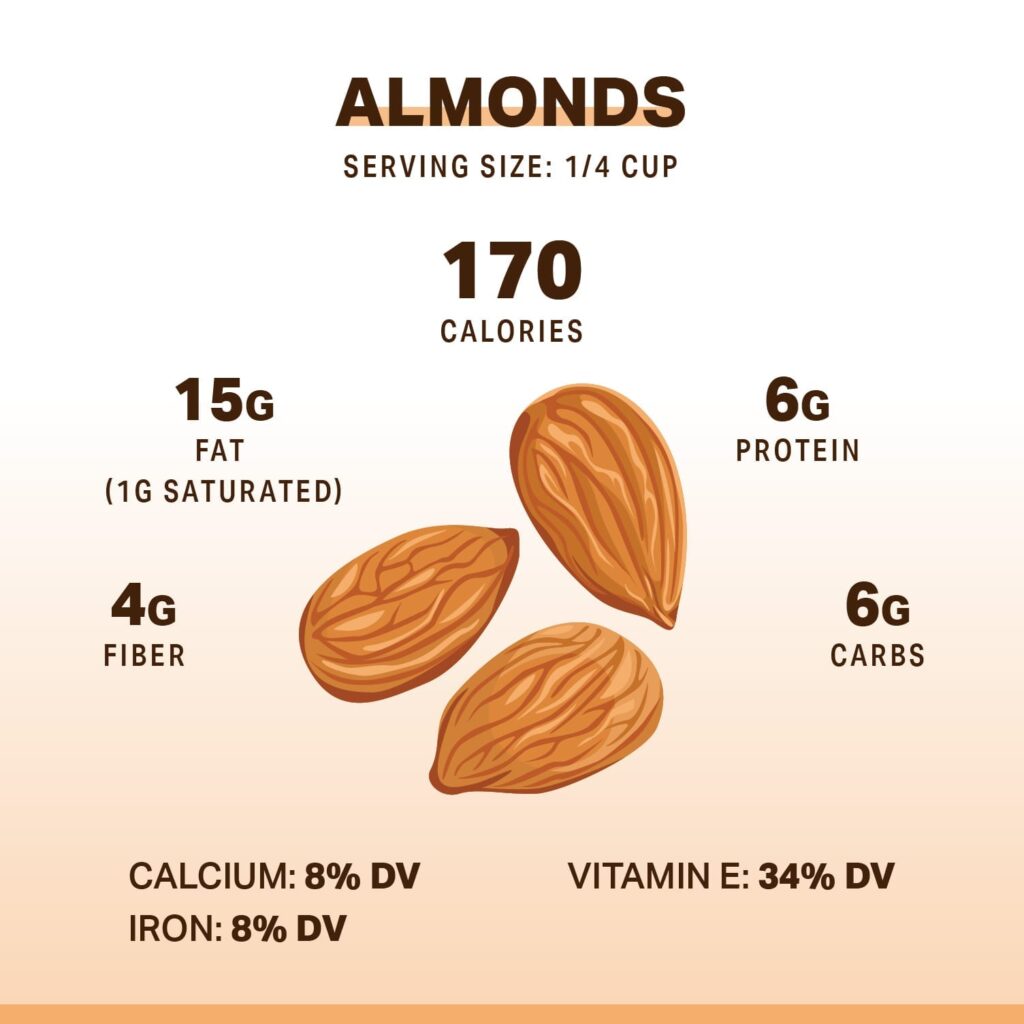Almonds are one of the most popular and versatile nuts enjoyed worldwide. They are not only delicious but also packed with a plethora of nutrients, making them a fantastic addition to any diet. This article delves into the nutritional profile of almonds and explores the numerous health benefits they offer.
Nutritional Facts of Almonds
Serving Size: 1 ounce (28 grams) or about 23 almonds
- Calories: 164
- Protein: 6 grams
- Fat: 14 grams
- Saturated Fat: 1 gram
- Monounsaturated Fat: 9 grams
- Polyunsaturated Fat: 3.5 grams
- Carbohydrates: 6 grams
- Fiber: 3.5 grams
- Sugar: 1 gram
- Vitamin E: 37% of the Daily Value (DV)
- Magnesium: 19% of the DV
- Riboflavin (Vitamin B2): 17% of the DV
- Phosphorus: 14% of the DV
- Calcium: 8% of the DV
- Iron: 6% of the DV
- Potassium: 6% of the DV
Almonds also contain smaller amounts of copper, manganese, and other essential nutrients.
Health Benefits of Almonds
- Rich Source of Antioxidants Almonds are high in antioxidants, which help protect cells from oxidative damage, a major contributor to aging and disease. The powerful antioxidants are primarily concentrated in the brown layer of the skin.
- Excellent for Heart Health The monounsaturated fats, polyunsaturated fats, and fiber in almonds contribute to heart health. Regular consumption can help lower LDL (bad) cholesterol and reduce the risk of heart disease.
- Aid in Blood Sugar Control Almonds are low in carbs but high in healthy fats, protein, and fiber. This combination makes them a perfect choice for people with diabetes. The magnesium in almonds also plays a crucial role in blood sugar control.
- Support Weight Management Despite being high in fat, almonds can help with weight loss. The fiber and protein in almonds increase satiety, helping you feel fuller for longer and reducing overall calorie intake. Additionally, some of the fat in almonds is not fully absorbed by the body.
- Boost Brain Function Almonds are often considered beneficial for brain health. They are rich in riboflavin and L-carnitine, nutrients that have been linked to cognitive function and may help reduce the risk of neurological disorders.
- Enhance Skin Health The vitamin E and antioxidants in almonds contribute to healthy skin by protecting it from oxidative stress. Vitamin E also helps in maintaining skin elasticity and hydration.
- Strengthen Bones Almonds are a good source of calcium, magnesium, and phosphorus, all of which are essential for maintaining strong and healthy bones. Regular consumption can help prevent osteoporosis and other bone-related issues.
- Improve Digestive Health The high fiber content in almonds supports digestive health by promoting regular bowel movements and preventing constipation. Fiber also fosters a healthy gut microbiome.
- May Reduce Inflammation The antioxidants and healthy fats in almonds can help reduce inflammation in the body, which is linked to many chronic diseases, including heart disease and cancer.
- Support Immune Function Almonds contain zinc, a mineral that is vital for maintaining a strong immune system. The vitamin E in almonds also acts as an immune booster.
How to Incorporate Almonds into Your Diet
Almonds are incredibly versatile and can be added to various dishes:
- Snacks: Enjoy a handful of raw or roasted almonds as a healthy snack.
- Breakfast: Sprinkle chopped almonds on your cereal, oatmeal, or yogurt.
- Baking: Add almond flour to your baking recipes for a gluten-free alternative.
- Salads: Toss sliced almonds into salads for added crunch and nutrition.
- Smoothies: Blend almonds or almond butter into your smoothies for a protein boost.
- Cooking: Use almond oil for cooking or as a salad dressing.
Conclusion
Almonds are a nutritional powerhouse with a wide range of health benefits. From promoting heart health and controlling blood sugar to enhancing brain function and supporting weight management, almonds are a valuable addition to a balanced diet. Enjoying almonds in moderation can help you reap their full benefits and contribute to overall well-being.





